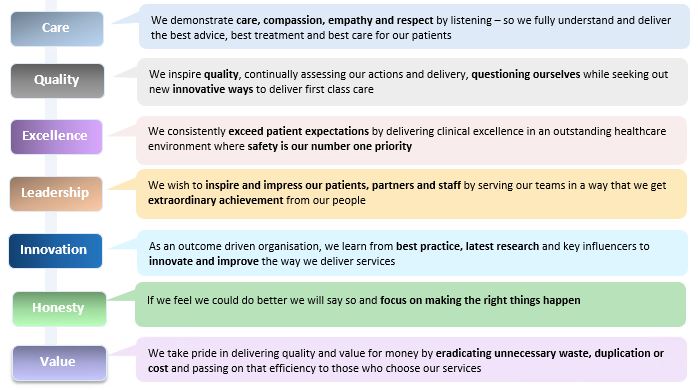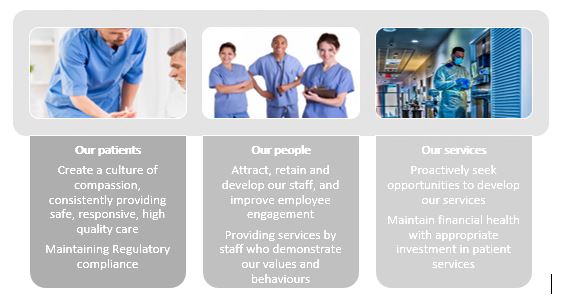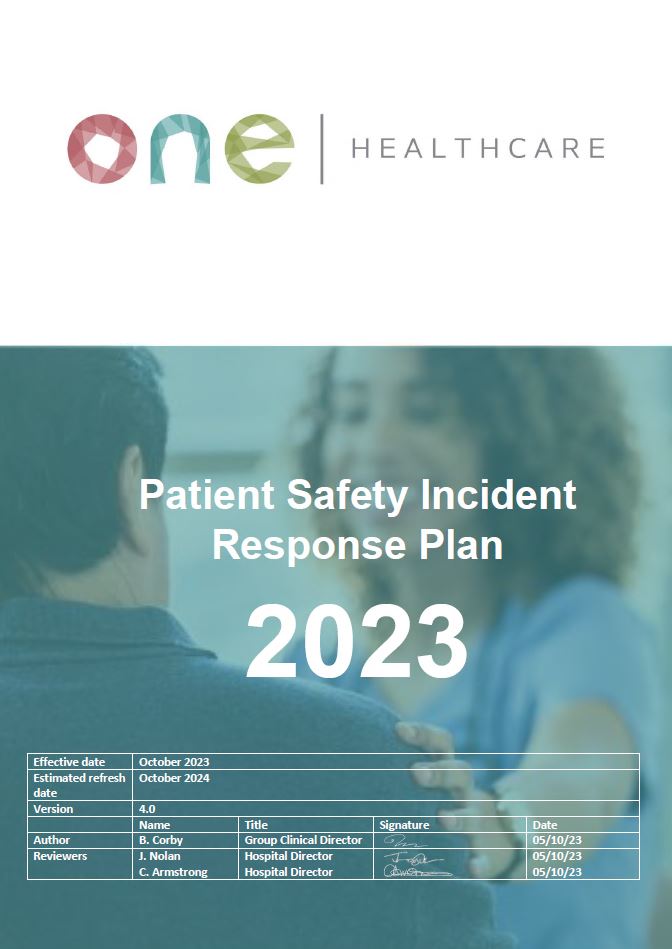Our Values

Our Strategic Objectives
One Healthcare provides exceptional care, in a modern and comfortable environment. In collaboration with the multidisciplinary team, including specialist consultant, experienced healthcare professionals and support staff, the hospitals are able to maintain professionalism, effective decision making and positive attitudes to ensure excellence throughout the patient journey.
Our Board (The One Healthcare Customer Board) sets our Strategic Objectives:

Organisational Structure
Decision Making
The role of the Board and our organisational structure
Our Board and committee tree is structured to monitor, manage and report governance and business activity. In particular – quality, standards, processes and action plans are developed, monitored, audited, reviewed and closed through these committees. Our Board plays a key role in shaping the strategy, vision and purpose of an organisation. They hold the organisation to account for the delivery of this strategy. They are also responsible for assuring that risks to the organisation and the public are managed and mitigated effectively.
We are required, by law, to make standing orders, which regulate the way in which the business of the organisation will be conducted. Our formal scheme of delegation defines the ‘top level’ functions the Board performs, and which of these are delegated to other directors within the organisation. The Board also has a formal set of standing financial instructions, which detail the financial responsibilities, policies and procedures adopted by One Healthcare Partners. They are designed to ensure that One Healthcare’s financial transactions are carried out in accordance with the law and Government policy in order to achieve probity, accuracy, economy, efficiency and effectiveness.
Generally, the powers to run our hospitals on a day-to-day basis are delegated to the Hospital Directors supported by their Management Teams.
Oversight of our integrated governance obligations is primarily through our monthly Cross-Site Governance Committee, with reporting and escalation directly to our Customer Board.
The Chief Executive / Chairman
The Chief Executive/Chairman is responsible and accountable to the Board for the delivery of the Organisation’s plans and objectives. He discharges this responsibility through executive directors and Senior Managers, which include the Hospital Directors.
The Chief Executive discharges his responsibilities through his team:
- Chief Financial Officer
- Medical Director
- Clinical Assurance Director
- Group Health & Safety Lead
- Information Governance Lead
- Hospital Director – One Ashford Hospital
- Hospital Director – One Hatfield Hospital
Each of our two Hospital Directors have their own management teams (Senior Management Team – SMT) and Heads of Department (HODs) who support them in their responsibility for the day-to-day operational management of their hospital. Each Hospital Director also fulfils the regulatory role of Registered Manager. The Chief Executive/Chairman currently holds the role of Nominated Individual.
Providing Assurance
How are we assured?
One Healthcare has a range of processes in place which together with its assurance committees, ensure that it is:
- Delivering its key priorities
- Identifying, mitigating or escalating risks and issues
- Able to satisfy itself that its policies, procedures and management mechanisms are working effectively
The delivery of an integrated governance framework relies on having:
- Robust internal (corporate) assurance mechanisms and quality governance arrangements – this is delivered through direct and indirect assurance provided through the organisation’s meetings structure to the Board and to external stakeholders, i.e. regulators, commissioners, external scrutineers, partner organisations and engagement groups
- Assurance mechanisms through the use of external and internal (independent) audit and seeking to review benchmarking/ peer review data, where available
- Robust accountability arrangements that ensure actions will be taken should risk/ performance issues be judged as requiring escalation.
These key mechanisms are identified in the following sections.
The Board Assurance Framework (BAF)
The BAF is the Board’s tool for the management and monitoring of strategic risk. Having identified the Organisation’s strategic objectives, the Board also identifies the key risks to the delivery of these objectives and the controls in place to ensure that significant risks are well managed. These are reported to and reviewed by the Customer Board on a quarterly basis.
The Board and Committees
The Customer Board is responsible for overseeing strategic risks outlined within the strategic risk register and corporate (Board) assurance framework. The One Healthcare Customer Board fulfils the responsibilities of and acts as the Group level:
- Audit & Risk Committee
- Quality and Clinical Governance Committee
- Workforce planning Committee
- Staff Health & Well-being Committee
- Health & Safety Committee – including Radiation Protection
- Information Governance and Data Protection Committee
- Infection Prevention & Control Committee
- Safeguarding Committee
- Patient & carer feedback Committee
- Drugs and Therapeutics Committee
The underlying cross-site and hospital level committee (and sub-groups) structure provides operational monitoring of these functions and will escalate all risks and issues to the Customer Board via the quarterly reporting mechanism. Each committee gets their assurance from:
- Risk registers
- Assurance reports received from directors
- Upward assurance reports from sub-committees
- Managers attending meetings
- Visits to wards and departments
- Information and performance reports
- Findings of Audits and inspections
Governance
Clinical Governance Arrangements – Board to Ward
We ensure a consistent approach towards clinical governance within each Hospital. Each hospital holds its own Quality and Governance Committee. Using a standard approach, these governance meetings will review and monitor patient safety, patient experience and clinical effectiveness by looking at a range of topics, including incidents, deaths and mortality, risks, complaints and patient feedback, clinical outcomes (including national audits and benchmarks) across their service. By doing this, we can ensure that we deliver and demonstrate continuous improvement in care and services and learning by:
- Ensuring that all staff within the clinical area are aware of who they can contact if they are concerned about an issue and providing a mechanism for them to receive feedback about what has happened as a result of reports made
- Considering and interpreting information across a number of areas in one place, for example incidents, reviews of deaths, complaints, audit results or patient feedback, and using this to prioritise areas for improvement and make changes to practice to prevent future harm
- Managing and reducing current risks to care delivery and mitigating against future risk
- Identifying areas for improvement or where more assurance is required
- Reviewing patient pathways, procedures, national and local policies and guidelines, standard operating procedures (SOPs), training requirements and the outcomes of interventions and making changes to these where required
- Allowing for clinical teams to learn and share experiences together in an environment that is focussed on reflection, learning and continuous improvement in practice
- Proving assurance or escalation of areas where further support is required to the next level in the assurance chain (see diagram above)
- Receiving and acting upon feedback and actions required from the levels above in the assurance chain
Information Governance
Information is a vital asset and Information Governance (IG) defines the way it should be processed in order to support the delivery of high quality healthcare and to run the organisation. In order to deliver effective patient care, One Healthcare Partners must process personal information and ensure there is an appropriate legal basis for that processing. Therefore, Information Governance is the way by which we handle information about patients, employees and members of the public.
Our Information Governance policies will cover:
- Access to Health Records
- Data Protection
- Freedom of Information
- Confidentiality
- Information Security
- Sharing of Information
Information risk management complements our overarching Risk Management Framework and the Senior Information Risk Owner oversees the handling of information governance risks. Serious risks are escalated to the Customer Board through the Group Risk Register and Board Assurance Framework.
Governance Committee
The multi-site Governance Committee primarily functions to:
- To promote a culture of transparency and best practice in governance assurance, to monitor, assess and act on all risks to the organisation
- To assist the Customer Board in meeting its clinical assurance responsibilities
- To assist the Customer Board in ensuring the effectiveness of the organisation’s clinical assurance controls
- To strengthen the position of the organisation’s stakeholders by providing a channel of communication between them and the Board in respect of clinical assurance matters and to provide advisers with a clear communication route in respect of Quality Assurance relating to clinical & non clinical assurance
- To review external legal/regulatory policy initiatives and developments relevant to clinical/ non clinical assurance and ensure appropriate processes are put in place to achieve compliance
- To ensure all material risks have been adequately identified and recorded and their impact is understood including the identification of new and emerging risk
- To review Internal Audit results and review the progress in completing recommended actions
- To review regular assurance reports from each hospital management, external advisers and other related parties on the operational effectiveness of matters related to risk and control
Practice Privileges
The criteria and conditions under which licensed registered medical practitioners may be granted authorisation by the Hospital Director to undertake the care and treatment of patients within our two hospitals are referred to as Practising Privileges or PPs. PPs are a discretionary personal licence to undertake consultations, diagnosis, treatment and surgery in accordance with relevant legislation, regulation, General Medical Council’s (GMC’s) Good Medical Practice (GMP) and One Healthcare’s policies and procedures.
At each Hospital, the Hospital Director is the Registered Manager and bears operational and regulatory responsibility for all activities within the Hospital. They are registered for this purpose with the Care Quality Commission. In carrying out this role, the Hospital Director is supported by a local Senior Management Team (SMT).
Save where an express written contract of direct employment is entered into with One Healthcare Partners Limited, all Medical Practitioners granted PPs with respect to a Hospital are independent self-employed contractors.
Whilst Medical Practitioners with PPs are independent self-employed contractors, the Hospital Director is required, as Registered Manager, to demonstrate that all those engaged (employed or otherwise) for the purposes of carrying out a regulated activity (e.g. surgery, treatment or diagnosis) at the relevant Hospital are ‘fit and proper persons’ (as defined in Regulation 19 of the Health and Social Care Act 2008 (Regulated Activities) Regulations 2014 (the Regulations). “Fundamental Standards” (previously “Essential Standards”) are now in place and must be adhered to.
The granting of PPs automatically enrols the Medical Practitioner into the Hospital’s Medical Society.
The Role of the Medical Advisory Committee
Each Hospital’s Medical Advisory Committee (MAC) is constituted by the Hospital with members representing the main specialties in the Hospital and elected by the Hospital’s Medical Society. The MAC represents the Medical Practitioners who practise at the Hospital. It is a key forum for constructive, two-way communication between the Medical Practitioners and the Hospital. It is intended to support and maintain quality, safety and measurable health improvement in the patient services provided at the Hospital.
The Role of the Medical Director
The Medical Director is the Medical Representative on the Board/Cross-site Governance Committee. His/her responsibilities include:
- Providing clinical advice to the Board and Cross-site Governance Committee
- Providing professional leadership and representing the consultant body to One Healthcare Partners Limited and vice versa
- Supporting the oversight of clinical governance
- Undertaking the statutory role of Responsible Officer for connected doctors whose designated body is the One Healthcare hospital who has granted them PPs
- Resolving disciplinary issues concerning Consultants
Patient Safety
Patient Safety Incident Response Framework (PSIRF)
In autumn 2023, One Healthcare implemented the use of the new Patient Safety Incident Response Framework to identify learning and make improvements following a patient safety incident. This represents a major step towards establishing a safety management system across healthcare.
One of the underpinning principles of this new framework is to do fewer “investigations” but to do them better. Better means taking the time to conduct systems-based investigations by people who have been trained to do them. This new approach challenges us to think differently about learning and what it means for us as a healthcare organisation. Our plan and policy describe how these new processes will work within One Healthcare.
For further information, please contact our Executive Lead for PSIRF:
Brenda Corby – Clinical Director
[email protected]
View our patient Safety Incident Response Plan by clicking on the image below.
We are proud to share our patient incident response policy (PSIRP)
Patient Safety Incident Response Policy
Regulation and Legislation
The Care Quality Commission
The Care Quality Commission (CQC) is the independent regulator of health and adult social care services in England. They ensure the care provided by hospitals, dentists, ambulances, care homes and home-care agencies meet the standards of quality and safety expected. The CQC register all health and adult social care services across England and carry out regular checks on them. Inspections take place regularly and at any time in response to concerns. In between inspections the CQC continually monitor all the information they hold about a service. This information comes from CQC inspections, the public, care staff, care services and from other organisations.
You can view each Hospital’s latest CQC report below:
We have internal processes in place through electronic recording systems to monitor our compliance levels against these standards of quality and safety, assisting us to be ‘Inspection Ready’ at all times.
Health and Safety Executive
At a national level both the Health and Safety Executive (HSE) and the Health and Safety Commission (HSC) are responsible for the regulation of almost all the risks to health and safety arising from work activity.
Together, these bodies are responsible for ensuring that providers of NHS funded care are fulfilling their legal obligations with regard to Health and Safety. One Healthcare Partners have comprehensive Health & Safety policies and processes in place to ensure we can meet these obligations. Oversight and monitoring of our compliance occurs via our internal committee structure with mandated reporting to the HSE when required.
Environmental Health/Food Standards Agency Standards
Local authorities are responsible for enforcing food hygiene laws and inspect our services to assess the food production and distribution process. They review:
- How our kitchens and catering service works
- Our food safety management system
- The types of food we make and prepare
Both of our hospitals have achieved the highest Food Hygiene rating (5 – hygiene standards are very good). This rating measures our standards of:
- Handling of food
- How food is stored
- How food is prepared
- Cleanliness of facilities
- How food safety is managed
NHS Contractual reporting to our relevant Clinical Commissioning Groups
One Healthcare Partners has contracts in place to provide NHS funded care. Under these contracts we report on a monthly basis to our Co-ordinating Clinical Commissioning Groups and have performance monitoring meetings to ensure monitoring and oversight of our performance against these contractual standards.
As part of the Independent Sector, One Healthcare Partners is committed to support our local NHS Trusts in the maintenance of their core services during the ongoing Covid-19 Pandemic. In this fast paced and constantly changing environment, we are playing a key role in supporting NHS patients on the Cancer Pathway who are requiring surgery.
The Private Healthcare Information Network (PHIN)
PHIN has a government mandate giving us the task of collecting information on safety, quality and costs for private hospitals and consultants, and publish information to support patient choice. Each private hospital is required to submit data about every privately-funded episode of care they provide. This includes:
- How many patients were treated in their facilities, and which consultant performed the treatment
- Patient feedback and satisfaction survey results
- Whether there were any safety issues or incidents.
Both of our hospitals routinely submit data on unplanned returns to theatre, unplanned readmissions, unplanned transfers, deaths, never events and healthcare associated infections.
To learn more on the Private Healthcare Information Network, click here


 One Ashford
One Ashford One Hatfield
One Hatfield